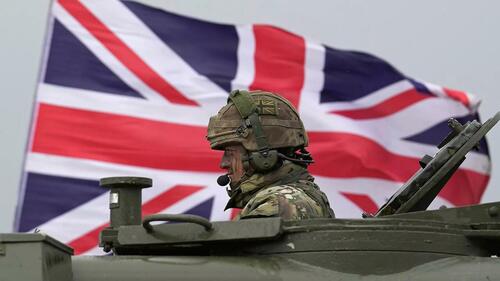NATO Admits ‘No Direct Threat From Russia’ as UK Army Chief Tells Citizens Prepare for Massive War

On Tuesday NATO Secretary General Jens Stoltenberg issued a surprising statement which drastically contradicted the anti-Moscow hawks in the US and UK, who have been claiming that Putin has his eyes set on expanding the war beyond Ukraine, potentially threatening the rest of Europe.
Stoltenberg told a press briefing when asked to assess the Russian threat against the Western military alliance that “we don’t see any direct or imminent threat against any NATO Ally.” The idea of an ‘imperial Russian expansionist war’ to gobble up territory into Europe has long been a mainstream talking point related to the Ukraine conflict.
The NATO chief continued, “And therefore, we, of course, monitor closely what Russia does, we have increased our vigilance, our presence in the eastern part of the Alliance, but the whole idea of that is to prevent an attack on a NATO Ally.”
His words were reported in both Russian and Ukrainian media sources. According to one Ukrainian source, “Stoltenberg recalled that in response to Russia’s full-scale invasion of Ukraine, NATO members increased defense production, not only to provide additional military assistance to Kyiv, but also to strengthen their own defense capabilities.”
Related to this, France and Germany in particular have been boosting their arms production, with France ramping up deliveries to Kiev too as Washington’s supplies are drying up:
France announced more planned deliveries of its Caesar artillery system to Ukraine on Thursday and accelerating weapons manufacturing as it seeks to avoid depleting its own military stocks while continuing to support the war effort against Russia’s invasion.
“The logic of ceding materiel taken from the armies’ stocks is reaching its end,” the French defense minister, Sébastien Lecornu, said in an interview with Le Parisien. “From now on, the solution is to directly connect French defense industries with the Ukrainian army.”
Stoltenberg in his comments from Brussels said the alliance is taking additional measures to secure Europe’s defense “by deploying more combat troops to the eastern part of the Alliance, by further increasing our defence investments, and also by exercising more”.
“We will have the big exercise starting later this week, which will be the biggest exercise in decades for NATO, with 90,000 personnel participating,” he added.
“We do all of this to ensure that we have the readiness, the preparedness and the forces in place to remove any room for miscalculation or misunderstanding in Moscow about our readiness to protect every inch of NATO territory. And as long as we do that, there will be no attack against the NATO territory,” he concluded.
Stoltenberg’s asserting firmly that NATO does not see any “imminent threat” against NATO allies comes amid a backdrop of rising alarmism from leading Western countries. For example, earlier this moth Swedish Armed Forces Commander-in-Chief Micael Bydén and Minister for Civil Defence Carl-Oskar Bohlin urged all Swedish citizens to “prepare for war”. Sweden is soon to be admitted into NATO.
On Wednesday, the head of the British army went so far as to issue a call for the civilian public to prepare for potential massive war with Russia:
General Patrick Sanders on Wednesday called on the British authorities to “mobilize the nation” to prepare for a war with Russia, in a speech at the International Armoured Vehicles exhibition in London.
Although he does not support conscription, Sanders stressed the need for a “shift” in the minds of the British public to be mentally ready for a military conflict with Russia.
“Our predecessors failed to perceive the implications of the so-called July Crisis in 1914 and stumbled into the most ghastly of wars,” he said in an address before the International Armoured Vehicles exhibition in London. “We cannot afford to make the same mistake today. Ukraine really matters.”
“This war is not merely about the black soil of the Donbas, nor the re-establishment of a Russian empire, it’s about defeating our system and way of life politically, psychologically, and symbolically. How we respond as the pre-war generation will reverberate through history. Ukrainian bravery is buying time, for now.” Within the speech, he said that he supports a vast increase in armed forces manpower, urging a near-doubling in size of the British army.
As for Germany, there’s plenty of skeptics in the Bundestag (parliament) when it comes to the question of whether Russia really presents an imminent threat to German national security…
“If you ask me, and if you ask most people in my party, the answer is unequivocally no,” Gunnar Beck, Member of the European Parliament for the Alternative for Germany (AfD) party who is currently Vice-President of the Identity & Democracy Group in the Parliament, told Sputnik. “Ever since 1990, at the end of the Soviet Union, the Russian government has gone out of its way to intensify economic relations between Russia and Germany. We had extremely favorable energy contracts with Russia. And Russia was a growing export market for our agricultural and industrial goods. It’s due to our government’s policy, vis-a-vis Ukraine conflict that relations with Russia are now almost at an all time low. So, on the one hand, I think, German policy and EU policy has been a provocation. Nonetheless, I think that the Russian reaction to the sanctions in particular has been tough, but at the same time measured. So in my view, Russia is no immediate security threat to Germany. Categorically not.”




